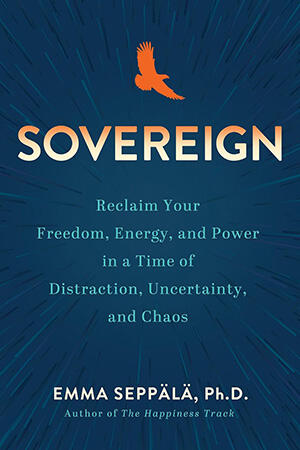The Best Leaders Use Intuition
In an excerpt from her new book Sovereign: Reclaim Your Freedom, Energy, and Power in a Time of Distraction, Uncertainty, and Chaos, Yale SOM’s Emma Seppälä writes that drawing on instinct as well as analysis can help you make better decisions.
When you’re making decisions, should you listen to your gut or only lean on reason? Research suggests we should do both.
Lynn Tilton lost her father as a teenager and experienced firsthand what the loss of the main income provider can do to a family. She got herself into Yale on a tennis grant, married while at Yale, became pregnant shortly after graduation, and soon became a single mom. It was the 80s and she launched into a career on Wall Street to support her child. Successful financially but sexually harassed daily, she planned to retire young once she had made enough money. But when she did, she had a dream that changed everything. A vision that came to her as an intuition that changed the course of her life and those of the hundreds of thousands of people her life would touch.

In her dream, her late father appeared to her and said, “This is not what I had in mind for you.”
Lynn realized that she needed to make her life about more than herself and to dedicate the rest of her career to making sure others would not have to go through the kind of suffering she and her family had when her father, the family’s primary provider, died.
So Lynn founded Patriarch Partners, a company that bought organizations on the brink of bankruptcy—companies that consulting firms and others had completely given up on—and turned them around—think Stila Cosmetics, for example.
Because she followed her intuition instead of squelching it as “magical” or “irrational” thinking, the Turnaround Queen, as Lynn came to be known, became the owner of the largest woman-owned business in America, at one point overseeing 700,000 employees whose jobs she had saved.
Turns out Lynn isn’t alone. Eighty-five percent of CEOs use intuition when making decisions. And for good reason.
While most of us have had gut feelings, instincts, or intuitions in our lives, we learn to brush them off as irrational. Yet research supports that intuition is an elegant, fine-tuned, and incredibly rapid form of perception we are wired for and that can help us make better decisions.
The Science of Intuition
Staff Sergeant Martin Ritchburg was at an Internet café on a military base in Iraq, speaking to his wife back home, when he got a weird feeling about a man who walked into the café. Ritchburg saved the lives of 17 people that day because his hunch was right and the man had planted a bomb.
Because of accounts like this and others, The U.S. military is investigating intuition and even has training programs to develop it further.
One example is a highly cognitive form of intuition you could think of as hyperawareness. Marine Corps officer Maurice “Chipp” Naylon, author of The New Ministry of Truth, described his experiences in Afghanistan. He shared with me that the U.S. Marine Corps Combat Hunter training is a way the Marine Corps has formalized the instruction of honing into your gut. It involves becoming an acute observer. You train your observation skills for deviations from the norm in your environment. When Chipp was in Afghanistan patrolling, for example, noticing that a usually busy playground was empty would indicate a deviation from the norm and be a sign of potential danger.
Another form of intuition is more of a gut feeling. Neuroscientist Joseph Mikels, professor of psychology at DePaul University, studies intuition more as an emotional or gut feeling. After all, when we speak about our intuition, we often talk about it as something “feeling right” or “feeling off.”
Kushal, a trader on Wall Street, had just entered one of the Twin Towers on 9/11. Orders were given to remain in the building. There was a lot going on and Kushal didn’t have time to deliberate rationally about what he should do. He had to make a decision and fast. His gut feeling told him to run. Because he followed it rather than the guard’s order, he saved his life seconds before the building collapsed
Mikels’ research shows that in situations—like Kushal’s—where matters are complex, you’ll make a better decision by following your feelings. He found this to be especially true for older adults whose cognitive faculties might not always be as sharp as younger people’s, showing that intuition is even more important with age.
Should You Always Follow Your Gut?
When I interviewed Lynn, The Turnaround Queen, for my book Sovereign, she shared: “I definitely move from my intuition. But intuition without intellect is like buying a plane without any propulsion. I do the analysis, but my decision comes from my place of knowing. You can’t shut off your intuition.”
And because she followed her intuition, she saved hundreds of thousands of working class families from succumbing to un-employment.
Joe Mikels gives good advice similar to Lynn’s. Given his research on intuition and how it can help you make a better decision in complex situations, he says he makes sure to “consult” it and take it into consideration along with all the other information he has.
Learning to Strengthen Your Intuition
How can you train yourself for intuition? Intuitive thoughts or a-ha moments are more likely to come when your brain is in alpha-wave mode, i.e. you are not concentrating on something, nor are you so relaxed that you could fall asleep. You’re in a meditative state of mind. Making time and room for alpha-wave moments will help you access it:
- Meditation: Research shows meditation makes you more creative and insightful. Meditation also increases your awareness.
- Nature: Research shows you’re more likely to come up with innovative insights after spending time in nature
- Time Off & Unplugged: Make time to be off your devices and in a more relaxed state. Although you may feel idle, your brain is actually in active problem-solving mode.
- Breathe: Learning to use your breath, you can significantly reduce your stress levels and cultivate a calmer, more meditative state of mind.
Excerpted with permission from Sovereign: Reclaim your Freedom, Energy, and Power in a Time of Distraction, Uncertainty, and Chaos by Emma Seppälä. Available wherever books are sold.
